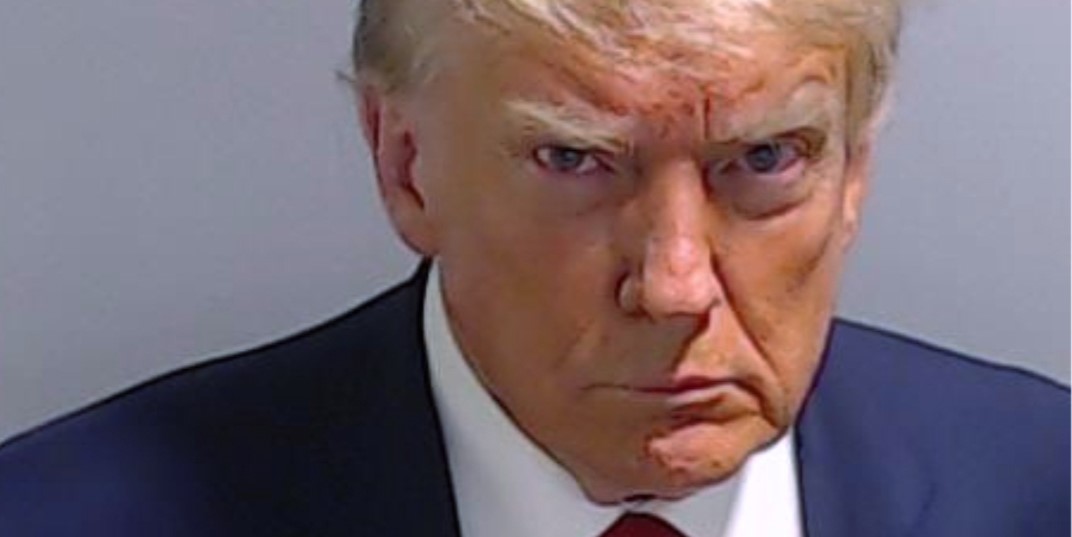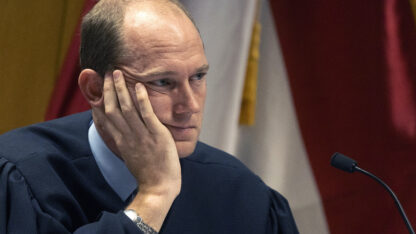After former President Donald Trump was booked at the Fulton County Jail in August, his campaign plastered the mugshot on mugs, T-shirts, bumper stickers and beverage coolers.
Trump’s campaign has reported raising millions from gear emblazoned with the former president’s mugshot, but who controls the rights to the image?
Anna Fey, who has worked as an agent in Georgia’s commercial photography industry for more than 35 years, believes Fulton County can and should register the copyright and go after licensing fees.
“The commissioners’ job is to be stewards of the county assets,” Fey says. “This is a county asset.”
The deadline to register the image to receive the broadest protection under federal copyright law would be Wednesday — 90 days since Trump stood for the now infamous mugshot.
Fey is pushing the county to act, but Fulton officials say they can’t or won’t pursue copyright protections.
The county government says Georgia common law prohibits the appropriation of one’s likeness by another, citing a court case brought by the estate of Dr. Martin Luther King Jr. against a company selling plastic busts of the late Civil Rights leader.
The sheriff’s office offers another explanation — a Georgia code allows anyone to receive booking photos so long as they aren’t used for extortion.
But according to Lawrence Nodine, a veteran intellectual property lawyer and adjunct professor at Emory University Law School, Fulton County’s reasons against registering a copyright don’t match the case at hand.
“Photos are copyrightable and no controlling case that I’m aware of makes an exception for mugshots,” says Nodine, though he notes it’s possible one interpretation of Georgia’s public records law is that mugshots constitute public property and are not copyrightable.
Lawsuit over mugshot would raise novel legal questions
Even if the county can own the copyright to a mugshot, Nodine and several other Georgia copyright attorneys tell WABE the law doesn’t provide a clear-cut answer about how to handle this particular image — a booking photograph of a former president created by the county sheriff’s office.
Efforts to seek damages for copyright infringement would likely end up in court — and Nodine thinks the county would have a tough time convincing a judge to stop Trump from using the photos for free.
The case would deal with so many novel legal questions — touching on everything from federal copyright law and the right to publicity to the First Amendment and public record laws — that it would make an excellent case study for a law school class, Nodine says.
For example, is the monetary value of the mugshot most attributable to the copyright value of the photograph itself or the newsworthiness of the man in the image?
Works of the federal government are excluded from copyright protections, but if Georgia government records are deemed public property under Georgia law, could mugshots be considered public domain?
The Georgia Attorney General’s Office has not weighed in on that question.
Individuals, not just the Trump campaign, have also tried to make a buck off the images. But is official campaign fundraising also considered commercial activity, or does it fall under fair use?
“The First Amendment newsworthiness of the mugshots is off the charts,” Nodine says. “So there’s a strong case for fair use.”
Such a decision by the courts could also have unintended consequences, according to Nodine. If a judge explicitly rules the mugshot to be in the public domain, that could end up limiting the government’s ability to prevent the misuse of other mugshots in the future.
A bad look for Fulton?
Beyond the uncertain legal terrain, Nodine says he would advise Fulton County against pursuing infringement claims for another reason.
“Suing just for the money would make it look like the state or the county was exploiting the criminal indictments for commercial gain,” Nodine says. “This is a very bad idea.”
A grand jury charged Trump and 18 others with conspiring to overturn Georgia’s 2020 election result. A trial is expected to begin next year.
Anna Fey acknowledges she has some personal incentive to push this issue, saying she is uniquely qualified to pursue potential copyright infringements on behalf of the county.
But more importantly, Fey says, this issue is a matter of principle with ripple effects for all commercial photographers, who have been hit hard by theft since the rise of digital.
“It’s not right to steal pictures,” Fey says. “And if we don’t do the right thing, then what’s to stop other people from continuing to do the wrong thing?”









